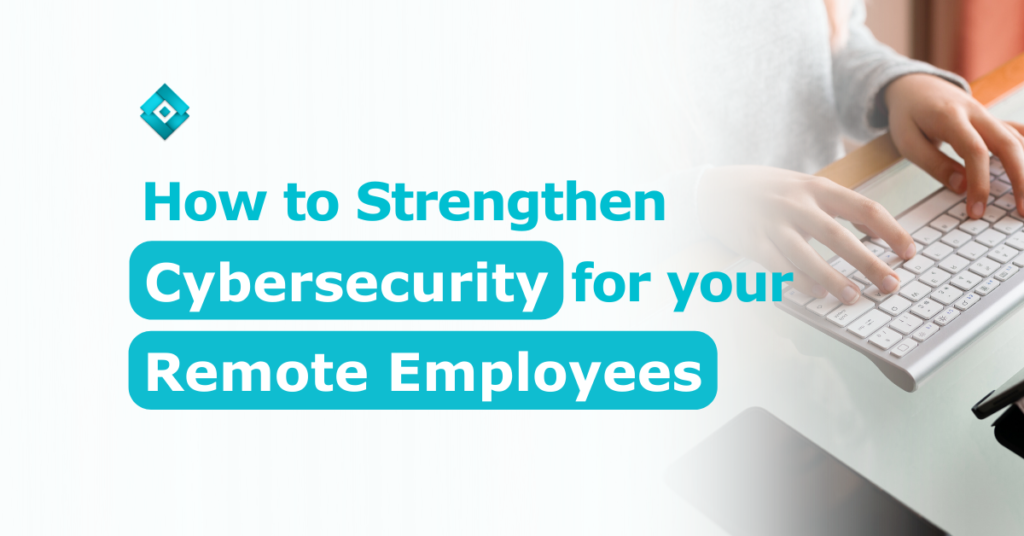As more businesses move towards remote work, keeping cybersecurity for your remote employees in mind is essential. However, employees working from home may use their personal devices for work tasks and access company data through unsecured Wi-Fi networks. In effect, this creates a risk of data breaches and cyber-attacks.
Here are three reasons why you need to strengthen cybersecurity for your remote employees
- Remote employees are more vulnerable to attack. Because they are not physically present in the office, hackers are more likely to target remote employees. Additionally, they may not access the same security measures as office-based employees or maybe less experienced in cybersecurity best practices.
- Remote employees have access to sensitive data. Consequently, the hacker could infiltrate sensitive company data by hacking a remote employee’s computer. This crucial information includes financial records or proprietary information. As a result, data breaches could damage your company’s reputation and result in expensive fines.
- Remote employees can be an instrument to launch attacks on other companies. Particularly, hackers may target remote employees to use their computers to launch attacks on other companies. For example, it might involve sending spam emails or infecting other computers with malware.
By taking measures to improve cybersecurity, you can help protect your company’s data and reputation and prevent costly breaches. The tips below provide how you can strengthen cybersecurity for your remote employees.
1. Conduct cybersecurity training for your employees.
There are a few things to remember when conducting cybersecurity training for remote employees. First, make sure that the lecture is relevant and up-to-date. Cybersecurity changes rapidly, so it’s essential to ensure that your employees are getting the most current information. Second, tailor the training to your company’s specific needs. Not all cybersecurity risks are the same, so addressing the most relevant threats to your company is essential. Finally, ensure the training is engaging and interactive to keep them involved throughout the training.
2. Provide authentication and authorization for company systems.
It’s essential to have strong authentication and authorization measures in place to protect your company’s systems. Specifically, one way to do this is to use a two-factor authentication system for all of your company’s accounts. This way, even if they compromise their password, the attacker still needs the second form of identification, such as a code sent to their phone, to access sensitive data.
Further, another way to strengthen cybersecurity for remote employees is to give each employee their unique login credentials. As a result, if an employee compromised their account, the attacker will not be able to access any other accounts or areas of the system. By taking these measures, you can help to ensure that your company’s cybersecurity is up to par, no matter where your employees are working from.
3. Teach them to practice good cyber habits.
As a business owner, it’s your responsibility to ensure that your employees practice good cybersecurity habits. After all, if just one employee falls victim to a phishing attack or other cyber threat, it could put your entire business at risk. Fortunately, there are a few simple steps you can take to help strengthen cybersecurity for your remote team.
First, ensure that all your employees are using strong passwords and encrypting their data. Second, educate your employees on the importance of cybersecurity and the dangers of clicking on links from unknown sources. Third, have them back up crucial files regularly. Finally, provide your employees with access to a secure VPN so they can safely access company resources from anywhere.
4. Don’t allow your remote employees to connect to a public network.
One of the main risks of remote work is using public networks, such as Wi-Fi in coffee shops or libraries. These networks are often unsecure, meaning hackers can easily access sensitive information. In effect, this can lead to data breaches, identity theft, or other serious problems. To avoid these dangers, remote workers should always use a private network to keep the company and business safe. By monitoring the kind of network they use, you can enforce cybersecurity for your remote employees.
5. Ensure they are keeping their personal and work devices separated.
When staff members use the same device for both work and personal activities, it opens up the possibility of leaking sensitive company information. Accordingly, this may result in loose cybersecurity for your remote employees. Further, it makes it more difficult to track where a cybersecurity breach may have originated from. As such, businesses need to have clear policies regarding using devices for work purposes. For employees who work remotely, this may mean using a dedicated work laptop or tablet that they keep separate from their own devices.
6. Secure your collaboration tools.
Having a virtual team means you’re relying on online collaboration tools to do some work. While this can be a great way to boost productivity, it also comes with some cybersecurity risks. If your company is using collaboration tools such as chat, video conferencing, or file sharing, it’s important to take steps to secure these tools and protect your data.
The first step in keeping the collaboration tools safe is ensuring only authorized users have access to them. The company can do this through strong authentication methods such as two-factor authentication. Second, consider encrypting data at rest and in transit to prevent unauthorized individuals from accessing it. Third, it’s a good idea to have a security policy that covers how employees should use collaboration tools and what they should do if they suspect a security breach. Finally, ensure that your collaboration tools are up to date because outdated software is more vulnerable to cybersecurity threats.
Hire remote employees who’ll keep your company secure.
In a remote setup, cybersecurity is a critical consideration that you should not overlook when hiring remote employees. By ensuring that your remote team has the skills and knowledge necessary to keep your company safe, you can help protect your business from potential threats.
Thus, choosing Core Virtual Medical Assistants (VMAs) or Virtual Assistants (VAs) who are expert in cybersecurity best practices is a step towards keeping your business. Through our vetting process, we ascertain that we give you VMAs and VAs that are up to a virtual setup.
To discuss your staffing needs, book a free discovery call with our industry experts!
Read more: 5 Business Statistics Why You Need a VA this 2022









